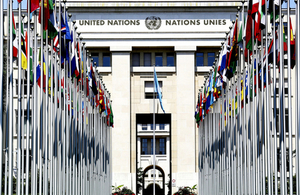UN Human Rights Council 41: UK response to the Special Rapporteur's report on racism
The UK thanked the Special Rapporteur for her visit to the UK as well as her report, and emphasised the UK’s continued support for her mandate.

Flags and Palais UN Geneva
Thank you, Mr Vice-President,
We would like to thank the Special Rapporteur for her visit to the United Kingdom and her report. We are pleased to see the Special Rapporteur acknowledge the UK’s leadership in key areas of racial equality, especially our legislative framework which prohibits racial discrimination. We also appreciate her highlighting the achievement of the Race Disparity Audit and its contribution to transforming formal commitments to racial equality into reality.
However, the UK Government rejects the suggestion that its policies further entrench racial inequality. The UK is committed to the total elimination of all forms of racism and creating a fairer society in which all people, of whatever ethnic origin or background, are valued and able to participate fully and realise their own potential. The UK has some of the most robust legislation anywhere for tackling hate crime. The UK has refreshed its Hate Crime Action Plan and we continue to fund hate crime reporting platforms including Tell MAMA and True Vision and are engaging with communities to ensure we are providing targeted support. We take heart from the latest Crime Survey for England and Wales which shows that hate crime has fallen by 40% over the last decade. The proportion of adults who were a victim of hate crime are the lowest since comparable data has been available.
It is disappointing to see the report’s misinterpretations of the Prevent Strategy. Prevent is a non-criminal programme to support vulnerable people at risk from the influence of terrorist recruiters and has an overwhelmingly positive effect. The report states, without any evidence, that Prevent ‘disproportionately’ targets Muslims. However, 2017/18 figures show that those receiving support from Prevent were just as likely to be inspired by right wing extremism as Islamist extremism. In January the Government announced an independent review of Prevent, to report back to Parliament before August 2020.
The report wrongly suggests that the Government’s underlying immigration enforcement strategy relies on private citizens undertaking frontline enforcement work. The Home Office’s Immigration Enforcement Directorate is responsible for enforcement action against those who commit immigration offences in the UK. Measures to regulate access to work, benefits and services complement this by encouraging compliance with immigration laws.
These measures have been in place and developed over many years and are consistent with legislative frameworks operated by most other comparable countries. Measures to control the right to work and the right to rent are in the interests of a fair society that supports those who play by the rules and protect the vulnerable who would otherwise be exploited.
The Government has acknowledged the errors made in the treatment of members of the Windrush generation and taken steps to put matters right, establishing a taskforce to assist individuals to secure status and documentation, and launching a compensation scheme for those wrongly affected by policies designed to tackle illegal immigration.
Prior to this the Government had begun work on a £500,000 annual Windrush Day Grant. This has supported community groups and local authorities to commemorate the Windrush generation and their contribution to national life. Planning is also underway for the creation of a permanent tribute at London Waterloo Station.
The Government has announced a series of measures to tackle barriers facing ethnic minorities in the workplace including a consultation on ethnicity pay reporting and the new Race at Work Charter. The latest ethnic minority employment rate is 66.5%, up 1.4 percentage points from last year - the highest since records began in 2001. Ethnic minority employment has risen by 603,000 since 2015, taking us 91% of the way to our target of increasing ethnic minority employment by 20% by 2020.
The Government welcomed David Lammy’s extensive review into the treatment of black and minority ethnic individuals in the criminal justice system. Progress has been made in a wide range of areas, and we are increasing the diversity of our new prison officer intake and creating a dedicated youth disproportionality team. The UK also recognises the need for our world class judiciary to be more diverse and will be funding a pre-application judicial education programme targeting those from under-represented groups.
Last month the Government also announced a commitment to a national strategy to tackle entrenched inequality and improve the lives of Gypsy, Roma and Traveller communities to improve outcomes in areas including health, education and employment.
In conclusion, the UK would like to emphasise its support for the important work Ms Achiume has undertaken and to assure the Special Rapporteur of the UK’s continued support for her mandate.
Thank you, Mr Vice-President.